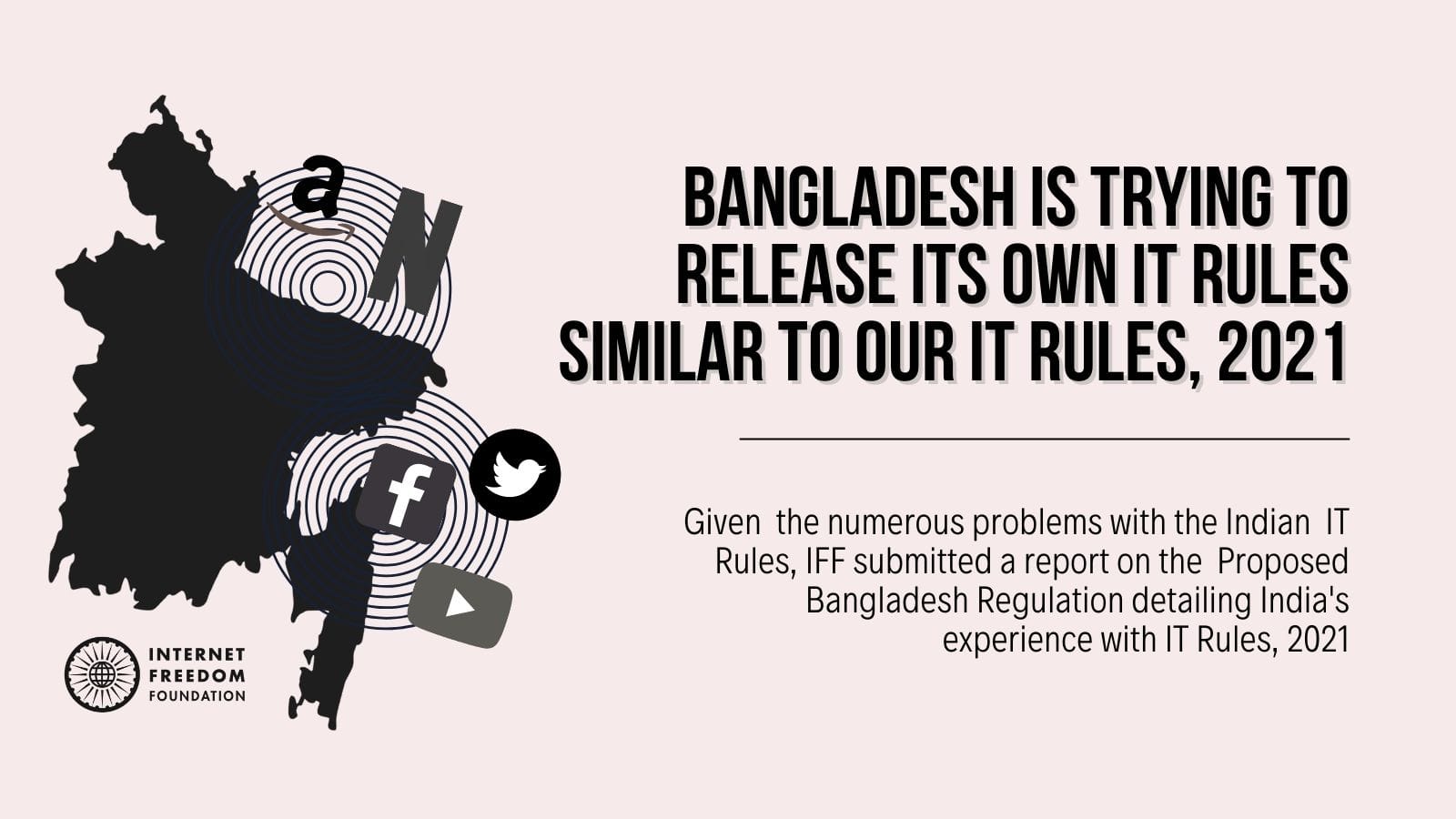
Tl;dr
On 3rd February 2022, Bangladesh Telecom Regulatory Commission (‘BTRC’) published “The Regulation for Digital, Social Media and OTT Platforms, 2021” (“Bangladesh Draft Regulation”) and invited comments. We sent our comments in the form of a report to the BTRC. Our rationale behind sending the comments was that there are many similarities between the Bangladesh Draft Regulation and Information Technology (Intermediary Guidelines and Digital Media Ethics Code) Rules, 2021 (“Indian IT Rules”). Since we have extensively worked on the Indian IT Rules since their notification in 2021 (in the form of public advocacy, representations and legal support), we provided insights into India’s experience with these rules. We hope that the report is of assistance to the BTRC as they contemplate regulation of digital, social media and OTT platforms.
Why should you care?
From a review of the provisions of the Bangladesh Draft Regulations, it is apparent that the Bangladesh Draft Regulations are based on the Indian IT Rules. Both seek to significantly increase government control over the three most common means of internet usage - social media, OTT platforms and digital news media. It seems that other jurisdictions have started to be “inspired” by the Indian approach to censorship, privacy and state control.
The Report
In response to a call for comments issued by BTRC, we prepared and submitted a report on the Draft Regulation to the BTRC. In the report, we have highlighted the similarities between the Indian IT Rules and the Bangladesh Draft Regulation. The Indian IT Rules were notified by the Government of India on 25th February 2021. These rules comprise three parts. Part I of the Rules lays down the definitions of terms. Part II imposes several obligations on social media intermediaries and is similar to Part II of the Bangladesh Draft Regulation, which does the same.
Part-III of the Indian IT Rules regulates digital news media and OTT platforms, via a Code of Ethics and a 3-tier grievance redressal mechanism headed by the Ministry of Information and Broadcasting. This Part is similar to Part III of the Bangladesh Draft Regulation. The only difference between the two is that the latter does not already contain a Code of Ethics, and instead empowers the Ministry of Information of Bangladesh to publish a Code at a later time (Regulation 9.01).
India’s Unpleasant Experience
Since its notification, Indian IT Rules have faced criticism from social media users, members of the civil society, press and intermediaries, and even by UN Special Rapporteurs. The criticism is on the grounds that these rules perversely incentivise intermediaries to censor otherwise lawful content lest they risk losing safe harbour; they undermine end-to-end encryption which is essential for protecting the privacy of users on the internet; and alter how publishers of news operate over the internet by increasing governmental oversight (see here for a detailed summary of concerns with Indian IT Rules). Considering the criticism evoked by the Indian IT Rules, it is not surprising that their legality has been challenged by at least 17 different entities/individuals in 6 different High Courts across the country.
Orders against the operation of provisions of the Indian IT Rules have been passed in challenges before Kerala, Bombay and Madras High Courts. The Kerala High Court was the first to grant interim relief, issuing an order restraining coercive action against the Petitioner, LiveLaw Media, under Part III of the Indian IT Rules. Subsequently, the Bombay High Court also issued an interim order, and stayed the operation of the Code of Ethics and the 3-tier grievance redressal mechanism over digital news media and OTT platforms. The Bombay High Court observed that the Rules would make people “feel suffocated to exercise their right of freedom of speech and expression, if they are made to live in present times of content regulation on the internet with the Code of Ethics hanging over their head as the Sword of Damocles.”
This order was affirmed by the Madras High Court, which also passed directions regarding Part II of the Indian IT Rules which regulates social media intermediaries. The Madras High Court found that “an oversight mechanism to control the media may rob the media of its independence and the fourth pillar, so to say, of democracy may not at all be there.” On social media, the Madras HC also observed that “Article 19(1)(a) may be infringed in how the Rules may be coercively applied to intermediaries.”
Even though the legality of the Indian IT Rules has not finally been decided, the decisions mentioned above are helpful in understanding the impact these rules have on freedom of speech and expression, the right to privacy, and how they have been viewed by constitutional courts in India. Since the Indian IT Rules are similar to the Bangladesh Draft Regulations, we hope the experience from India will assist BTRC in preparing regulations to govern digital, social media and OTT platforms.
Important Documents:
- The draft "Bangladesh Telecommunication Regulatory Commission Regulation for Digital, Social Media and OTT Platforms, 2021" (Link)
- Information Technology (Intermediary Guidelines and Digital Media Ethics Code) Rules, 2021 (Link)
- IFF’s report on Draft Regulation for Digital, Social Media and OTT Platforms, 2021 (Bangladesh) and IT Rules, 2021 (India) (Link)
This post was drafted by Tejasi Panjiar, Capstone Fellow hosted at IFF and reviewed by Krishnesh Bapat, Associate Litigation Counsel, IFF.
